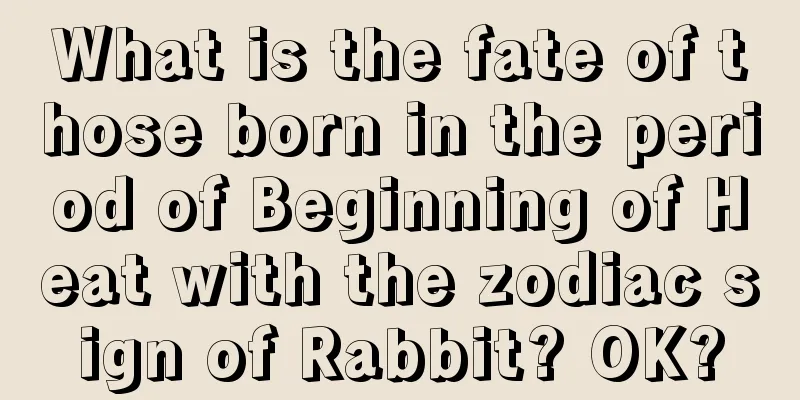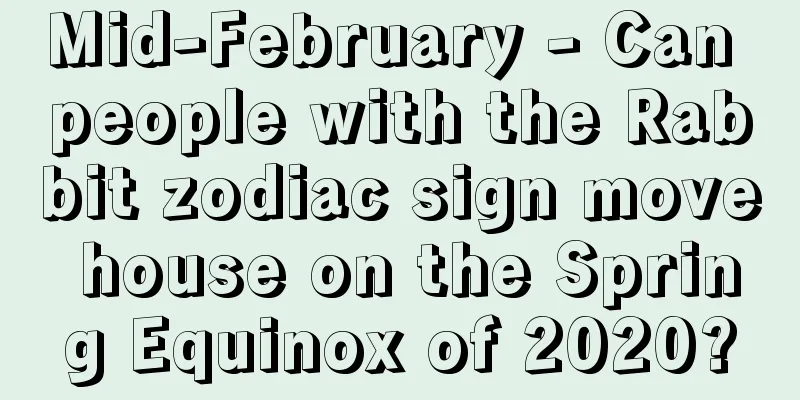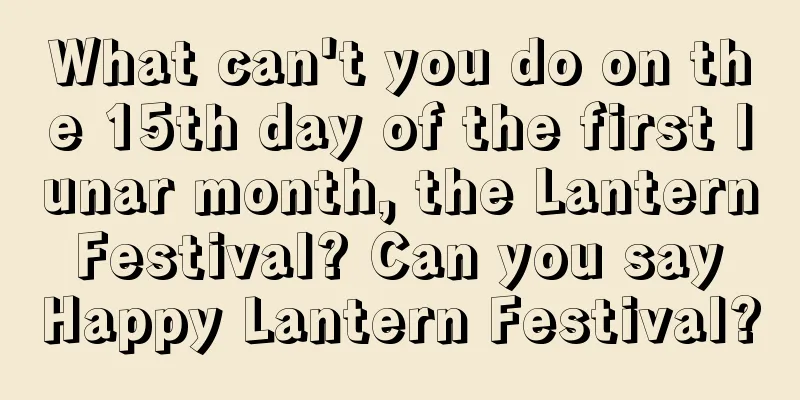Interpreting the Feng Shui story of the great men Mao and Chiang Kai-shek

|
Introduction: The relationship between Mao and Chiang Kai-shek can be said to be both an opponent and an enemy, which is similar to the relationship between Zhuge Liang and Zhou Yu during the Three Kingdoms period. "If there is Yu, why is there Liang?" Chiang Kai-shek's failure was inevitable, but did you know that there are also some Feng Shui factors hidden in it? Next, I will tell you the Feng Shui story about Mao and Chiang Kai-shek, let’s learn about it together! Folk wisdom is compiled into stories, including many Feng Shui stories. Let’s take a look at them. Admittedly, it is not comprehensive to say in general that Chiang's feng shui is not as good as Mao's. In fact, each of them has their own advantages in Feng Shui. In terms of good fortune, wealth, longevity, and longevity, Mao is not as good as Chiang; but if we have to put the two together as opponents in war, it is true that Chiang is not as good as Mao. Looking back at the history of the Kuomintang and the Communist Party coexisting and competing with each other, combined with the advantages and disadvantages of the two people's yin and yang houses, the feng shui predictions are so consistent with the actual situation. Is it a coincidence or inevitability? It is inevitable that people will have endless associations, but the answer is self-evident. In the contest between kings, Feng Shui has its own destiny. Analyzing from the nobility of the dragon veins and the state of the dragon, among the Five Great Mountains, Mount Hengshan, the Southern Mountain, cannot be considered the most precious dragon. But since it can be listed among the Five Great Mountains, it must have its extraordinary features. Mount Tiantai ranks last among the four famous mountains in China. Compared with Mount Hengshan in Nanyue, the two have their own merits and the difference between them should be comparable. But if you compare them carefully, you will find that they have distinct characteristics: Hengshan Mountain is majestic and powerful, while Tiantai Mountain is noble and beautiful. These differences of Taizu Mountain continue to be reflected in the branches and courses of the dragon veins. Shaoshan has great jagged edges and sections, and crosses rivers and lakes, highlighting its grandeur in its great openings and closings; the dragon vein of Xikou rises and falls, with people coming and going in an endless stream, showing its nobility in its hundreds of miles of length. The difference of Shaozu Mountain is even more obvious. Shaofeng Mountain, known as the 71 peaks of Nanyue, is sharp and pointed, intimidating the mountains. It is even more powerful than Naibu Mountain in Xikou. Its combativity and attack power are unmatched by the other side. In addition, the Shaozu Mountains in the two places are both rebuilt and stand out, both of which serve as dragon chariots and the most respected imperial thrones. Interestingly, Mao’s ancestral tomb was in the shape of an ox pulling a cart, with a straight dragon entering the head and forming an ox-shaped cave; Jiang’s former residence was first led by a lion and finally by a dog pulling a cart, with a hidden dragon entering the head and forming a pearl-spitting shape. Judging from the shape of the dragon's lair, the Mao family's ancestral tomb is particularly powerful. Zhejiang is a place that produces famous officials, wealthy people, talented men and beautiful women. "There is heaven above and Suzhou and Hangzhou below", and Zhejiang is one half of it. The area is surrounded by picturesque scenery, with towering peaks and lively dragon veins. It has been a prosperous town since ancient times and a good place for wealth, prosperity and heroes. The well-developed water system is one of Zhejiang's major advantages, and this advantage is fully reflected in the Jiang family's former residence. The winding and affectionate clear stream of Xikou is obviously better than that of Shaoshan. But this advantage is mainly reflected in the two aspects of population and wealth, and the fact that old man Time has indeed allowed the two great men to have descendants proves this. The reason why the dragon vein of Shaofeng is better than that of Jiang's former residence in Xikou is not because of the water, but because of the contrast between the thickness and strength of the mountains. Compared with the short, powerful, closely connected and compact mountain range of Shaoshan of his opponent Mao, and compared with the inverted Big Dipper of Shaoshan on which Mao, who dared to fight and was good at fighting, grew up, Chiang Kai-shek's Xikou terrain structure is wide and stretched, with the arrangement of important instruments in moderation and clear contours on the left and right, but the dragon veins and the layout of the terrain are scattered and lack cohesion. The gorgeous and elegant appearance of the Chiang's former residence was naturally overwhelmed by the solid and powerful attack from the opponents in Shaoshan, and was completely defeated. When Mao was making revolution in Jinggangshan, he answered his comrades-in-arms' question "How long can the red flag fly?" with a vivid metaphor: Chiang Kai-shek of the Kuomintang was like a big water tank, and the Red Army was like a small stone, which would eventually smash the big water tank. What’s amazing is that this metaphor is also a vivid interpretation of Mao and Chiang’s Feng Shui. Looking at Mao's life, he often won by surprise, broke the rules, took the initiative to defeat the enemy, and handled things with ease. This is actually related to the unique and unconventional Feng Shui pattern of Shaoshan. Judging from the characteristics and style of the dragon veins, Xikou is a place with beautiful scenery. Chiang's former residence is backed by mountains and faces water, with beautiful scenery of water and mountains, which is very attractive. Snakes, fish, turtles, elephants, lions and phoenixes are entrenched on both sides of the river. Everything is in accordance with the rules. The Feng Shui shape is arranged strictly in an orderly manner according to the rules, reflecting the traditional Chinese Feng Shui characteristics, and is filled with the atmosphere of Confucian thoughts of benevolence, righteousness, courtesy, wisdom and trustworthiness. Chiang Kai-shek's marriage is also grand and dignified, shrouded in a strong political color, and is a perfect combination of power and wealth, heroism and wisdom, hero and beauty; Mao's ancestral tomb in Shaoshan has a magnificent layout, complete precious utensils, and is eclectic. The mountains and rivers are both beautiful and smart, full of the Legalist idea of adapting to the situation, and have the ability and courage to subvert the court and start a new business to change the world. Mao criticized Confucianism and Confucius and was against feudalism and tradition throughout his life. The roots of these behaviors of Mao in the future can be traced back to the Feng Shui characteristics of Shaoshan's inverted Beidou. Mao, who adhered to the "three no-talk" policy in his youth, also had love and marriage that were obviously different from Chiang Kai-shek's. Chiang Kai-shek was confused and chaotic when he was down and out, but he turned over a new leaf after he became successful and quickly got back on the right track. He was a completely different person, a complete example of a "prodigal son who returns is worth more than gold." He not only valued feelings, but also family affection, decency, and all worldly things. Mao loved beauties, but he loved the country even more. His view on love was obviously not linked to politics. Due to the different historical backgrounds of war and peace, his partners included ladies from prominent families, the "flower" of Yongxing, and "actors". As a military strategist and politician, he was as simple and unpretentious as the landscape of Shaoshan. He was not particular about details throughout his life. He could not spend too much energy and time on emotional issues and had to give up his love for his children. His heart was always filled with his motherland and his people. The Azure Dragon and White Tiger in Jiang's former residence are spacious enough, with obvious space left. The lion on the right is extremely ferocious, reminding people of Chiang's "five main forces", "eight Vajras" and the insidious and vicious Military Control Commission, but lions also take naps sometimes. At the water mouth, there were first the turtle and snake meeting the axis of the sky and the earth at the Jiang family’s former residence, and then there were the lion, elephant and North Star guarding the water mouth, locking it layer by layer. This Feng Shui advantage is enough for him to defeat his opponents one by one and become the leader of a country. But if we look closely, we will find that the turtle and the snake lack attacking power; the lion and the elephant have no secure connection with the water outlet; the North Star stands alone and tall and lacks response. When luck was good, it helped him to conquer the world, end the warlord separatism, unify China, and establish the glorious Chiang Dynasty; but the superficial glory could not conceal the essential shortcomings. The feng shui defects destined him to have bad luck sometimes. When he met a truly powerful enemy, he was bound to collapse, and his eight million troops were wiped out. In comparison, the Mingtang of Mao's grandmother Liu's tomb is well-preserved and impeccable. Shaofeng Mountain, which is slanted and named "Tongtian Wulong", presses down the mountains from south to north, first the Tiger-shaped Stone Drum Peak which is comparable to it, and then continues to press down on other mountains. These mountains that cannot be compared with Shaofeng Mountain obviously feel the pressure, and spread out in strips and blocks to the northwest and northeast, giving rise to Longtou Mountain, Niuxing Mountain, Lema Mountain, Dashigu, Eighteen Arhats and other mountains connected by points and lines (these mountains are the people who are submissive to it and serve Gu Zulong Cave). On the surface, it seems to be disorderly, but in fact, the combination of mountains and waters is entirely determined by the need and never sticks to the rules. Therefore, the dragon energy becomes shorter and more powerful, and it contains infinite vitality everywhere. The powerful twisting between the mountain and the water, and the close coordination of the combination punches, give people a mysterious feeling of infinite power and endless vitality. Objectively speaking, Chiang was more than capable of dealing with ordinary opponents, but when he met Mao, his weaknesses were immediately exposed and he felt powerless in the struggle. Looking at the dispute between Chiang and Mao from the perspective of Feng Shui, one can clearly feel that the two men were not competing fairly on the same platform and following the same rules. People who have been to Shaoshan are impressed by the sea of lush mountains surrounding Mao’s former residence and ancestral tombs. From the perspective of Feng Shui, the source of this ocean of mountains is Shaofeng, also known as Shaozu Mountain, and its center is southwest of Heishizhai, where the tomb of Mao’s grandmother, where the noble lady sat under the dragon carriage, is located. Although the dragon's lair does not follow the rules of the supreme azimuth and facing south, and the mountains and hills are not arranged clearly at a glance, and the formation of dragon veins seems to violate the rules of imperial feng shui, it is precisely these seemingly unconventional mountains and waters that follow the most fundamental principles of feng shui, and are interconnected, with rich and profound meanings. Over the past 500 years, with the exception of Liu's tomb, the locations of Mao's Yin and Yang houses have their own merits. They are slightly lacking in the common people's pursuit of storing wind and gathering energy, and stabilizing wealth and population, but this piece of land still has many precious objects representing the supreme emperor, and the power of chain generation is particularly huge, with earth-shaking effects. After hundreds of years of family management, nine years after Grandmother Mao buried the main grave, a great man was born in Shangwuchang. Mao, who represented the hopes of 20 generations of the Mao family for revitalization and becoming king, walked out of Shaoshan with the spirit of taking the world as his own responsibility and being the one who could take on the responsibility after his ancestors finally completed the comprehensive layout of Feng Shui. In less than sixty years, corresponding to the ocean of mountains in Shaoshan, the most extensive wave of people's revolution was aroused across the country, and the rule of the Chiang Kai-shek dynasty was finally submerged in the vast ocean of people's war. Mao, who walked out of Shaoshan, accomplished a great cause that shook the world and left a glorious page in the history of the Chinese nation. |
>>: How to use Feng Shui to create romance and deepen feelings on Valentine's Day 2017
Recommend
Is it appropriate to set up the bed today, June 1, 2019, Children's Day? What are the Feng Shui do's and don'ts for setting up the bed?
Introduction: Setting up the bed is also an import...
Is it suitable to set up a bed on the 18th day of the fourth lunar month in 2018, Children’s Day?
Introduction: Beds are important to people, and wh...
Is the 14th day of the winter month in the lunar calendar in 2019 an auspicious day for travel? Analysis of travel precautions!
Introduction: It is generally necessary to choose ...
Is the lunar October 20th, the Big Snow solar term, in 2017 a suitable date for marriage?
Introduction: Marriage is an important event in li...
The Secret of Feng Shui: What are the Five Realities and Five Needs?
Introduction: People often say: Be honest and don...
Where is the God of Happiness on August 22, 2021 in the lunar calendar, and where is his position at different times?
Each season is divided into three months: Meng, Zh...
Is the 26th day of the twelfth lunar month in 2019 suitable for marriage? Check the auspiciousness and inauspiciousness of this day!
Introduction: It is generally necessary to choose ...
Can I sign the contract on November 13th of the lunar calendar in 2017?
Introduction: Winter is coming, the wind is cold a...
Where is the direction of the God of Happiness on the 20th day of the 11th lunar month in 2018?
It is November of the lunar calendar in 2018, and...
Is the 26th day of the sixth lunar month in 2018 a good day to worship ancestors?
In the eyes of Chinese people, ancestor worship is...
Is June 17th of the lunar calendar 2022 an auspicious day? Can we get engaged?
A good engagement time is chosen by many people. L...
Is the first day of the fifth lunar month in 2019 a good day to burn incense and worship Buddha?
What is the auspiciousness or inauspiciousness of ...
A Complete Collection of Proverbs on the Jingzhe Solar Term
Jingzhe is one of the 24 solar terms in China and ...
Where is the lucky position of the God of Wealth on February 13, the second day of the Chinese New Year in 2021? How to welcome the God of Wealth during the Spring Festival
Introduction: The lucky position of the God of Wea...
How many days will the Lantern Festival holiday be on the 15th day of the first lunar month in 2021? Lantern Festival holiday notice!
There are many statutory holidays in our country. ...









